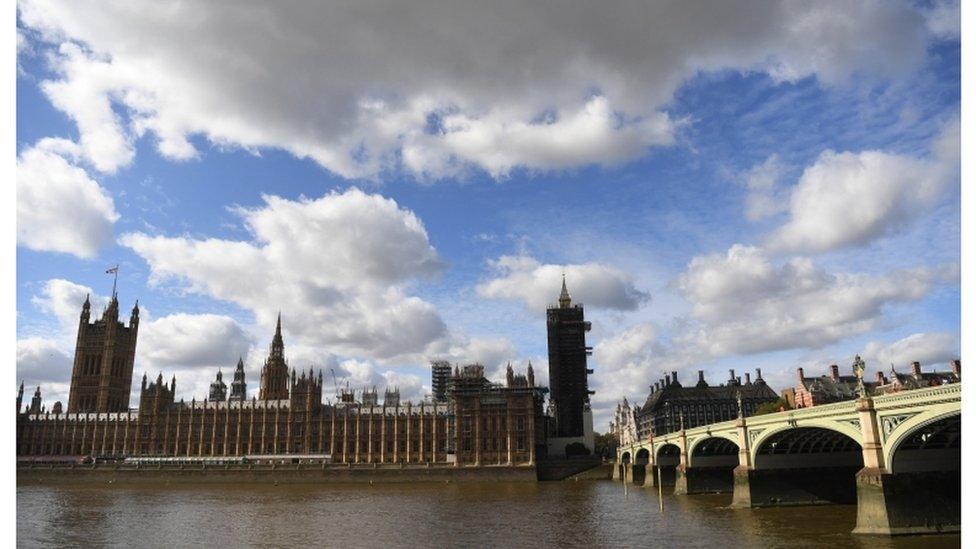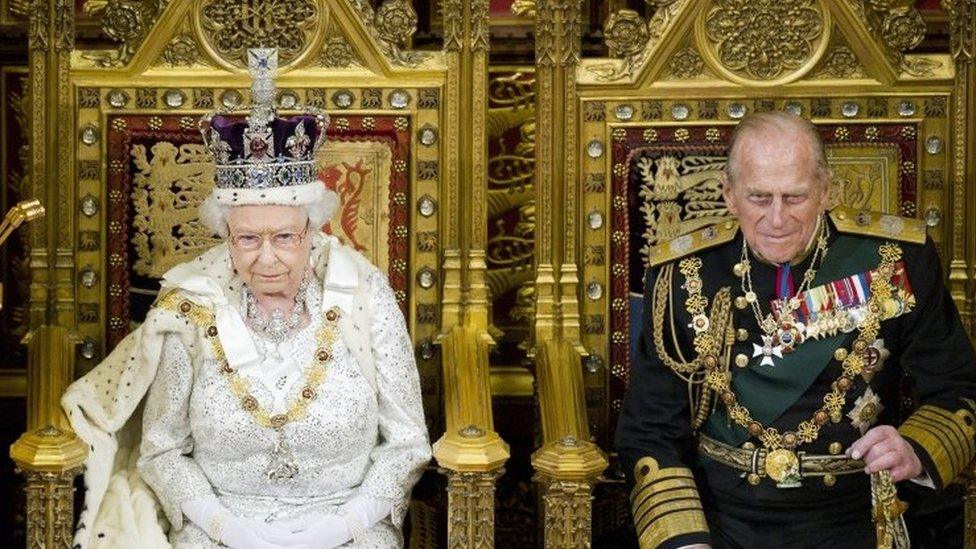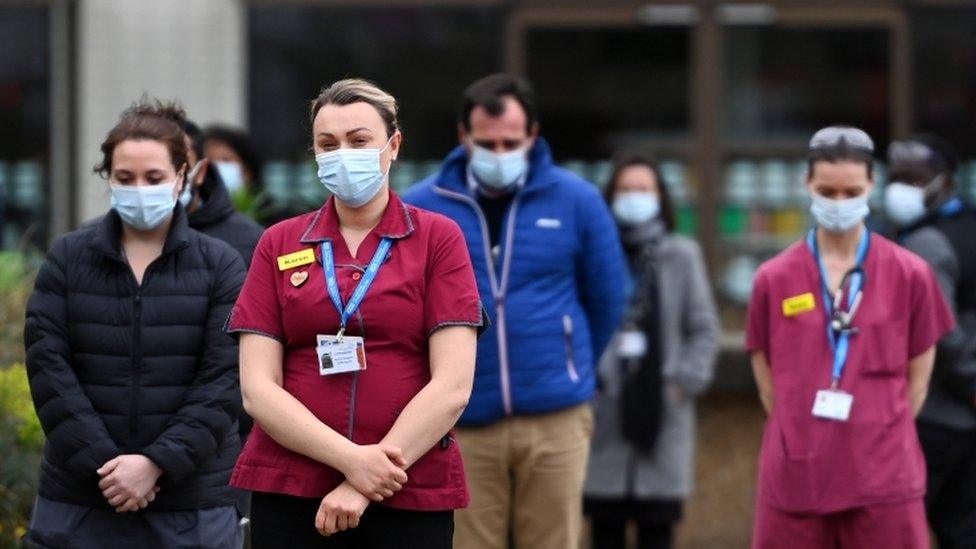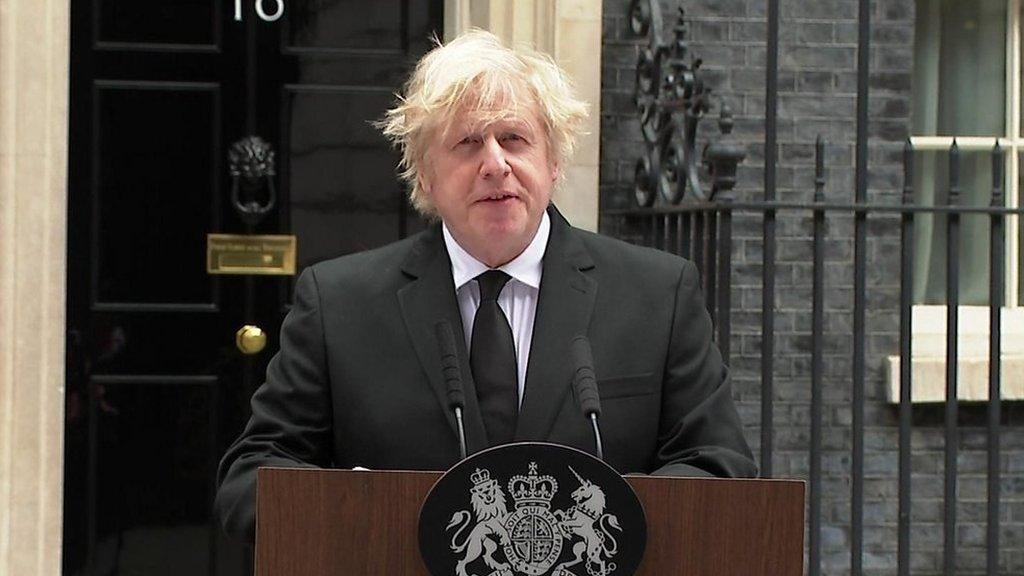The week ahead in Parliament
- Published

Unexpectedly, Parliament returns to the solemnity attending a royal death - with MPs and Peers offering their formal tributes to the Duke of Edinburgh on Monday.
But the pressing issues of politics will resurface on Tuesday; what will the next moves be in the battle against coronavirus? And will the government have a majority for some of the more controversial possibilities?
When Parliament resumes, expect opponents of vaccine passports and supporters of a swifter exit from the restrictions to be on the move during the inevitable ministerial (maybe Prime Ministerial) statements updating MPs on the pandemic.
Given the increasingly forceful tone of the Conservative backbench Covid Recovery Group (proprietors: Mark Harper and Steve Baker), it seems clear that there is strong support for a faster exit, and their opposition may not even need to be orchestrated to make its presence felt. If it is strong enough, it may well deter the PM from even attempting to pass, for example, legislation to bring in some form of vaccine passports.
The next few weeks' Westminster action will be happening against the background of a vast and important set of elections - for the Scottish Parliament and the Senedd, for the Mayor of London and regional mayors, for county councils and police commissioners, and for any number of local council seats. Governments are supposed to avoid big-ticket policy announcements in the run-up to elections, but there will doubtless be many attempts from all directions to attack opponents as polling day looms.
The other sub-plot is that it is not long until the end of the parliamentary session, the moment when the legislative music stops. Any bills that are not safely passed, or "carried over" into the next session, are lost.
So much of the activity in this coming week, and the remaining weeks until that last trumpet sounds, will be aimed at speeding through big government measures like the Domestic Abuse Bill (see below) and, in the Lords, completing the consideration of the handful of private members' bills (laws proposed by individual MPs) that have made it through the Commons.
This gives the Lords a little extra leverage when peers vote to amend a bill. Just before Easter, they notched up their 100th government defeat of this session, many of those will have been on changes to legislation which ministers opposed. Next in line will be the Overseas Operations (Service Personnel and Veterans) Bill, the measure designed to provide some protection against prosecutions for historic offences.
There's also some fallout from the last Lords-Commons clash; in the wake of the extended parliamentary ping-pong over the Alton amendment, on trade with states complicit in genocide, will a special committee be set up to examine allegations? There's talk of a high-powered Lords committee of ex-Supreme Court justices, so keep an eye on the Lords Liaison Committee, which would have to approve any such scheme.
Here's my rundown of the week ahead:
Monday 12th April
The Commons were not due to sit today, but will now meet at 14:30 to allow tributes to be paid to the Duke of Edinburgh.
The last such royal tributes were paid on the death of the Queen Mother, in 2002. In a two-hour sitting, there were set-piece speeches from the prime minister and party leaders, followed by the Father of the House, then Tam Dalyell, and then backbenchers who had some particular connection.
In 2002 they included Labour's Oona King, recalling the Queen Mother's visits to the East End, during the Blitz, and Liberal Democrat John Thurso, whose constituency covered her beloved Castle of Mey. The debate was on a motion to present a Humble Address expressing the deep sympathy of the House.

The Queen and Duke of Edinburgh at the State Opening of Parliament in 2013
The Lords will also pay tribute to Prince Phillip after prayers (13:00).
There will be speeches from the party leaders, the Convenor of the Crossbenchers and a Bishop. Then ministers will face questions on how non-hate crime incidents recorded on police databases are being flagged up on people's employment checks, the Council of Europe's guidelines on the use of biometric facial recognition systems, access to footpaths under "agri-environment schemes" and extending the permitted storage time for human embryos and gametes. That last comes from Baroness Deetch, the former chair of the Human Fertilisation and Embryology Authority.
There will then be a short adjournment, after which they will move on to the main legislative action, the second day of report stage consideration of the Financial Services Bill, where the issues in play include the regulation of "buy now, pay" later transactions, and of bailiffs. There is an amendment from the Lib Dem Lord Sharkey to help people locked into mortgage deals, so-called mortgage prisoners, by capping the interest rates they are charged and, under certain circumstances, making fixed rate interest deals available. It is likely to be pushed to a vote.
Watch out, too, for possible government moves in response to amendments calling for the creation of Sharia-compliant student loans.
Tuesday 13th April

Expect the Budget debate to feature criticism of the government's planned 1% pay rise for NHS nurses
The Commons begins (14:30) with Health and Social Care questions. This will almost certainly be followed by one or more ministerial statements or urgent questions - not least on the planned lifting of pandemic restrictions.
The Conservative Gareth Johnson has a Ten Minute Rule Bill on road use charging for outer London - it's a subject he has raised before, when he opposed the idea of charging all vehicles registered outside of London £3.50 every time they cross the boundary into London. This bill would ban the Mayor of London from imposing such a charge.
The main law-making will be the Second Reading debate of the Finance Bill, which puts the tax changes announced in the Budget into law - Labour has an amendment declining a Second Reading because of the dispute over NHS pay awards and the government's "failed economic strategy"; the SNP amendment says the budget continues austerity, and ends the furlough scheme in September.
Interestingly, two Labour MPs (Clive Lewis and Geraint Davies) pop up as signatories on the Green MP Caroline Lucas's amendment declining a Second Reading over a lack of urgent action to prevent climate change. The Speaker normally selects the amendment from the official opposition, ie Labour.
It's always worth keeping an eye on how the detailed consideration of the Bill is divided up; the contentious bits are taken in Committee of the Whole House, while the lower profile sections go to a smaller committee of MPs. Predictably the big-ticket tax changes will be discussed by the whole Commons, but so are the sections dealing with the furlough scheme and other pandemic support, including help for the construction industry.
In Westminster Hall there's a debate led by former Westminster City Council Leader Nickie Aiken on repealing the 1824 Vagrancy Act (16:30).
On the Committee Corridor, Health and Social Care (09:30) takes evidence on the treatment of people with autism and learning disabilities. Foreign Affairs (14:30) focuses on China's Xinjiang detention camps.
In the Lords (12:00) there are questions on the forthcoming UN Biodiversity Conference in China, and the impact of the new EU residence permit system of Church of England clergy. Sadly, the late Lord Greaves had a question down on improving rail services to smaller towns in northern England.
The main legislative action is the Report Stage consideration of the Overseas Operations Bill - the measure designed to protect service personnel and veterans from prosecution for historic offences. A considerable number of votes are expected - there's a cross party amendment from Lord Robertson, the former NATO Secretary General, and supported by Lord Alton, (fresh from his attempts to pass an anti-genocide amendment to the Trade Bill), which would ensure the presumption against prosecution in the Bill does not apply to war crimes, crimes against humanity, genocide or torture.
There is a whole series of amendments from the former SDLP Leader Baroness Richie, which aim to limit the extent of the bill's application in Northern Ireland courts. These are based on the argument that the bill cuts the Belfast Agreement requirement to incorporate the European Convention on Human Rights into Northern Irish law and give direct access to the courts and remedies for ECHR breaches.
In the Lords, warning bells always ring in the government whips office when an amendment is fronted by a senior Crossbencher and supported by cross-party heavyweights. They will be taking seriously the amendment from the former Supreme Court Justice Lord Hope, backed by the former Lord Chancellor, Lord Falconer, the Lib Dems' Baroness Smith of Newnham and former Chief of the Defence Staff, Lord Craig of Radley, to ensure that the time limit on legal actions against the Crown excludes actions brought by serving or former service personnel.
Similarly, the amendment from former chiefs of the defence staff, Lord Dannatt, Lord Boyce and Lord Stirrup to create a new duty of care for the Ministry of Defence, for legal, pastoral and mental health support for service personnel involved in investigations or litigations arising from overseas operations, looks very threatening. Especially so when it is also signed by Labour's deputy chief whip, Lord Tunnicliffe.
Given the likely majority for most of these, the government will have to decide what compromises it can offer, or risk another extended bout of ping-pong, as the bill bounces back between the Commons and the Lords. It seems quite possible the Bill's critics would not be heartbroken if it was lost when Parliament is prorogued in a few weeks' time.
Wednesday 14th April
The Commons begins (11:30) with half an hour of questions to Alok Sharma, the former Business Secretary, in his new role as President of the COP 26 Climate Change Summit. Then, at Noon, it's Prime Minister's Question Time.
The day's Ten Minute Rule Bill, from Labour's Carolyn Harris, calls for a report on the NHS pay award which falls below 2.1 per cent, and to require a Commons vote on the pay settlement.
The main event will be a Labour Opposition Day debate on a subject to be announced.
Committees include Human Rights (15:00), looking at the human rights implications of a long lockdown.
In the Lords (12:00) there are questions to ministers about revising the history section of the Life in the UK handbook for people applying for citizenship, the market review of initial teacher training, and the progress of the review into police surveillance by the Undercover Policing Inquiry.
The peers resume Report Stage consideration of the Financial Services Bill.
Thursday 15th April

The Education Committee says the UK is not doing enough to support adult learning
Commons business begins (09:30) with International Trade questions, followed by the announcement of the agenda for the following week, by the Leader of the House.
Then MPs will move on to consider Lords amendments to the Domestic Abuse Bill, which could put the government in a tight spot if they try to reverse the nine defeats they suffered in the Lords. These are on some very potent political issues, including Baroness Royall's amendment to add domestic abusers to the sex offenders register, as well as amendments on protection of migrants and including carers within the scope of the Bill.
There's a considerable cross-party coalition building up, and the lesson of the handling of the "Alton amendment" to the Trade Bill, on genocide, is surely that seeking to finesse them away by procedural means would store up greater trouble for later.
In Westminster Hall (13:15) there's a debate on the Women and Equalities Committee report, "Unequal Impact," which warns that coronavirus restrictions and the focus on the needs of the most vulnerable have hit support for the broad population of disabled people. The report states that amongst other things, coronavirus restrictions have made it harder for those with disabilities to access food.
Then (15:15) MPs turn to the Education Committee's recent report on the need to revamp the UK's lifelong learning system - a subject on which the committee chair and former education minister, Robert Halfon is very focused.
The Committee says the current set-up does not deliver anything like the same levels of training and education as the UK's competitors and proposes that there should be an adult community learning centre in every town, a lifelong learning account for every adult, providing funding (or partial funding) for courses, and skills credits for business, so any investment they make in staff training can be at least partially written off against tax. The idea is to promote retraining and boost skills levels in the UK.
In the Lords (12:00) ministers face questions on improving the welfare of domestic animals, variation in treatment standards for Crohn's disease and colitis across the UK, and the use of intercept evidence in criminal trials.
Then, Peers deal with the detail of some of the crop of private members' bills rushed through the Commons a month before - starting with the Conservative former minister Lord Vaizey's bill on the borrowing powers of the British Library. Then comes Baroness Blower's bill on safeguarding children in further education and training and Lord Kennedy's bill on regulating forensic science. These could all be quite brief, because the measures all have broad support. Peers also are aware that any amendment passed would mean the bills would have to return to the Commons, where there might not be time to consider them before the end of the current parliamentary session; they would then fall.
In other words, this is probably going to be a rubber-stamping exercise.
That's followed by the Report Stage of the National Security and Investment Bill - the measure to allow government intervention when a foreign government or company buys into a UK company regarded as important to national security. There are amendments on oversight by the Intelligence and Security Committee, concerns about protecting higher education, and speedy handling of notifications of action under the new law.
Friday 16th April
The Lords sits (11:00) to debate the remaining private members bills sent over from the Commons - starting with the second readings of the Prisons (Substance Testing) Bill, the Botulinum Toxin and Cosmetic Fillers (Children) Bill and the Animal Welfare (Sentencing) Bill
That is followed by committee consideration of the Education (Guidance about Costs of School Uniforms) Bill - again this could be quite brief, because amending the bill would probably kill it. But there may be "probing amendments" designed to extract a ministerial response on the detail of the Bill, rather than to be put to a vote.
Related topics
- Published9 April 2021

